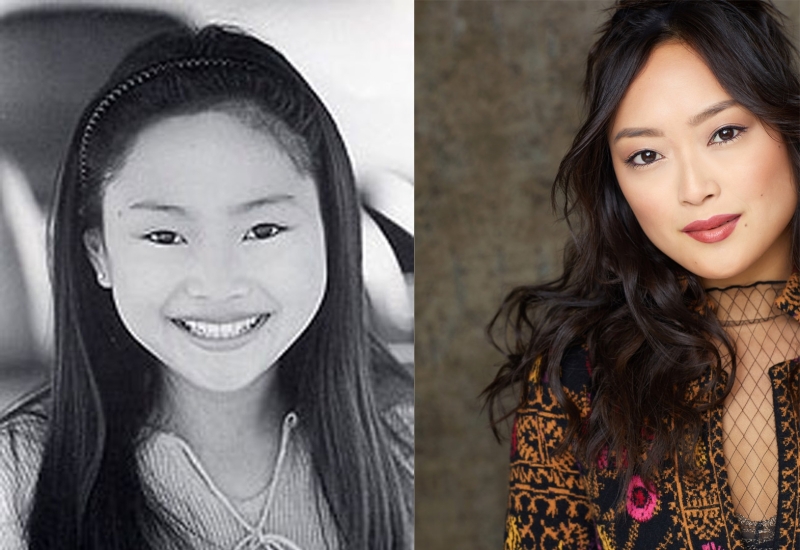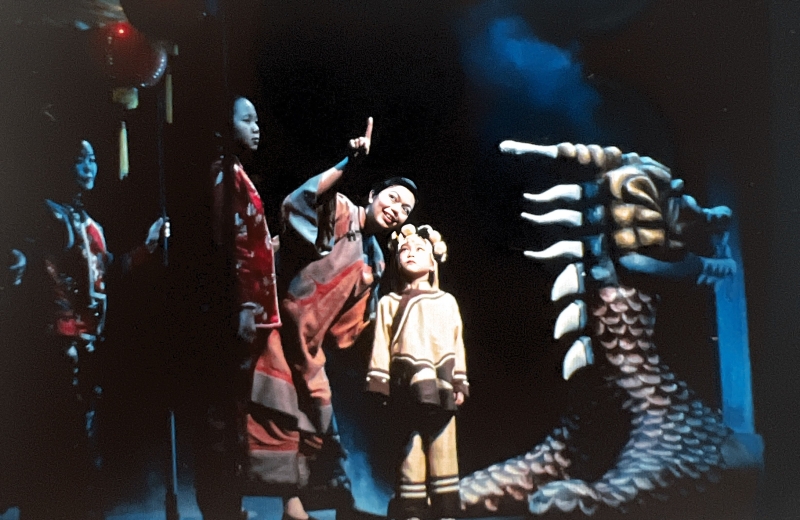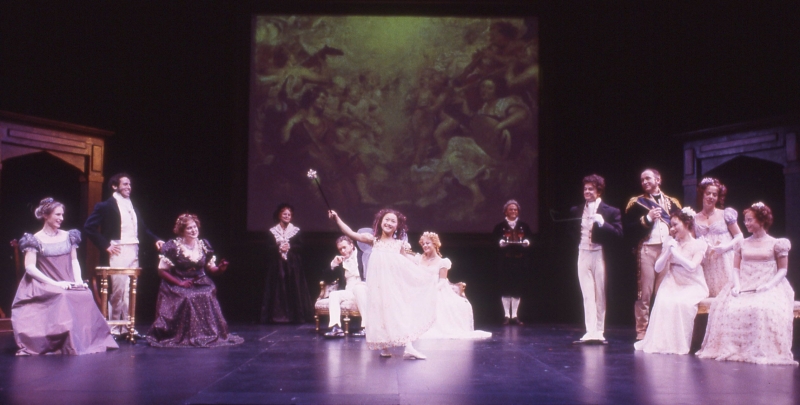Interview: Sophie Oda of MISS BENNET: CHRISTMAS AT PEMBERLEY at TheatreWorks Silicon Valley Comes Home for the Holidays
The Bay Area native plays the youngest Bennet sister in the yuletide sequel to Pride and Prejudice running through December 29 in Palo Alto
(L to R: Sophie Oda as Lydia Bennet, David Toshiro Crane as Arthur de Bourgh, and Elissa Beth Stebbins as Mary Bennet in TheatreWorks Silicon Valley's Miss Bennet: Christmas at Pemberley, photo by Kevin Berne)
For Bay Area native Sophie Oda, coming back to TheatreWorks Silicon Valley for Miss Bennet: Christmas at Pemberley definitely feels like a full-circle moment. Oda appeared in several shows with the company when she was still a young girl, including the fondly-remembered musicals Pacific Overtures and A Little Princess, but hasn’t worked there in roughly two decades. In the intervening years, she earned her BFA in Musical Theatre from UC Irvine and moved to Los Angeles where’s she amassed numerous film and TV credits on shows such as “Hawaii 5-0” and “The Big Bang Theory,” and had a recurring role on “The Suite Life of Zack and Cody.”
Having recently relocated back to the Bay Area, Oda is only too happy to be onstage once again at TheatreWorks, the company she’s long considered her artistic home. And how perfect that for her return she’s performing in a work that is at its core a celebration of home and family, and an exploration of what those things mean to us. Written by Lauren Gunderson and Margot Melcon, the play is a sequel to Jane Austen’s iconic Pride and Prejudice that imagines what occurs when the Bennet family gathers back at Pemberley a few years later to celebrate the holidays together.
I spoke with Oda by phone last week just as she was looking forward to the cast’s first time rehearsing onstage at the Lucie Stern Theatre. We talked about how this play fits into the Austen oeuvre and how her character of Lydia Bennet has grown up since Pride and Prejudice, revisited some of Oda’s seminal experiences working at TheatreWorks as a child, and discussed why the company remains so special to her. The following conversation has been condensed and edited for clarity.
Miss Bennet: Christmas at Pemberley is inspired by Jane Austen’s work, but it’s not strictly adapted from one of her novels, correct?
It’s an adaptation of Pride and Prejudice as sequel, and is I believe the fourth play written by these playwrights based on characters from that novel. It’s nice because the playwrights have tried to stay true to what Jane Austen fans would hope for in their favorite characters like Elizabeth Bennet and Darcy, and at the same time have given a new perspective on some other characters as well.
Tell me about your character, Lydia Bennet.
Lydia is the youngest sister and how you would expect from Pride and Prejudice, but it’s a few years later and we get a look into her life and how it’s developed. At this point, she’s been in her marriage for a few years to Wickham. She’s still young, in her late teens, and I think she’s matured a lot, but in ways she probably didn’t expect. Her marriage has not been a happy one and her husband is not a true partner to her, so she’s been pretty much starved for affection, for connection.
I think coming back to see the family is frightening due to the lack of honesty that she’s shared with them the past few years, but also a warm and soft place for her to land. She struggles with her need for protection versus her need to connect, and that’s essentially her journey through this play. The tension has grown so much that something’s gotta give and a change needs to be made within her relationship to her family. Events of the play lead her to realize that being open is very, very difficult, but it must be done to allow the people close to you to understand you better.
Before being cast in Christmas at Pemberly, did you have much exposure to Austen’s writing?
You know, I owe much of my exposure to TheatreWorks because I remember seeing Pride and Prejudice when they did it, I remember seeing Emma. So I’ve really enjoyed Jane Austen and TheatreWorks being in like a marriage together, you know?

Sophie Oda, Then and Now
This isn’t your first show at TheatreWorks, even though it’s been quite a while since you’ve appeared with the company. What was your first show there and how old were you at the time?
My first show at TheatreWorks was The Joy Luck Club, which was a beautiful show. It was the world premiere of the play, and I feel very fortunate to have been a part of that as an introduction to TheatreWorks. Even though I was maybe 7 or 8, it wasn’t my first professional show, but it was my first time out of my immediate area, because I was about an hour away from the theater. It was an exciting extracurricular activity for me – I just thought it was fun.
I remember meeting [TheatreWorks Founding Artistic Director] Robert Kelley, I remember the beautiful costumes and how I really felt like I was an integral part of the puzzle. Even at that age, I remember feeling a lot of agency. Just knowing that what I did mattered is a significant memory to me.

A young Sophie Oda (center) in The Joy Luck Club
at TheatreWorks Silicon Valley in 1999 (photo by David Allen)
And then you went on to appear in some musicals at TheatreWorks. How did that happen?
During Joy Luck Club, Kelley stopped me in the large hallway backstage and I guess he was thinking about his next shows because he asked me, “Hey, Sophie, can you sing?” I said [meekly], “Yes.” And he said, “Okay, can you sing something for me now?”
Right there in the hallway?!
Yeah. I was, and am, a singer and that’s how I got into theater. I love to sing and I think I might have sung [sings in a light, clear soprano] “Who will buy this wonderful morning? Such as sky you never did see.” I think I had something already in my head because maybe I just went to voice lesson. I had no nerves about it, it was just like “I’m 7 – sure!” I think he kind of took that information and then inserted me into several shows after that.
What other shows did you do as a kid at TheatreWorks?
After Joy Luck Club, I did Jane Eyre where I was Adèle, the little French girl; I did Pacific Overtures, which does not normally have a child in it – he just put me in it [laughs]; and then I did the world premiere of A Little Princess. I did some workshops leading up to it where I played Sara Crewe and it was quite an experience because I got to work one-on-one with [composer] Andrew Lippa.

Sophie Oda (center) in Jane Eyre at TheatreWorks Silicon Valley in 2003
(photo by David Allen)
What is it like to be part of a new musical?
Oh, I love it! The process is very fast-moving, there’s edits almost every day. It’s exciting to see new work up on its feet. It incites a lot of curiosity in me, and to this day I love doing readings and workshops for new musicals. I feel like it’s an opportunity as a performer to perform something as if it’s already yours, give it life, give it attitude and just embody the energy that the song is giving to you.
Because normally when you’re singing a song, you’re just singing a song, right? It doesn’t necessarily have to sound like you wrote it or like you own it. But when you are in a new musical, it’s very helpful to have that kind of embodiment of the song. It’s exciting to see someone really just dive in and sing it like they’ve been singing it for years.
I have to ask you specifically about Pacific Overtures because I remember that production vividly, and it’s still one of my favorite shows I ever saw at TheatreWorks. It’s such a complicated and ambitious show that I can’t imagine doing it as a child. What was that experience like?
Oh, that was incredible. That show in particular is something I still hold really dear to this day. Yeah, the music is very complicated, but it’s also very beautiful and the story is very abstract so it can be produced many different ways. It was an all-Asian cast and I felt like it was almost an internal celebration, just the fact that we got to be there and play with each other. I was young still, probably 10, so the complexities of being in a professional, all-Asian show with this beautiful Sondheim score I probably didn’t fully absorb that at the time, but I loved it.
And I loved tying the women’s obis. I would stand on a stool and the costumer taught me how to tie an obi. Because the bow is in back, it’s easier if someone else can just do it for you. So I would help people get ready and then I played the Emperor. That role is sometimes played by a puppet, so to indicate that I had large sticks hanging from my arms and people were actually puppeteer-mastering me, and it was a very important scene.
The cast got particularly close, and it added to my experience of being the only kid, or one of the only kids, around many adults. I learned so much professionalism from all those experiences. To be around these professionals who were really having the time of their lives? I mean…
Earlier this year, I interviewed Kelley and musical director William Liberatore and they also talked about how that Pacific Overtures cast and how close everyone became. It’s really interesting to hear you felt the same thing even though you were only 10 years old at the time.
Yeah, and you know what’s interesting, too? We went through a lot. It was at the time of 9/11, and I think we had a performance that day. I just have memories of that, of being in the green room and still not really knowing the gravity of the situation, I suppose. But there was definitely an energy there of feeling like we could hold true to the importance of what we were doing and allow the people who had come to the show to experience what we had created – despite and in lieu of the events of the day. I remember feeling a heightened importance to our work that day.
What has it been like coming back to TheatreWorks as an adult?
It is wild to be back, and I’ll say this time around it is an entirely different experience. There are still a few people who work here that I know and recognize from before - mainly it’s faces because I probably didn’t know names back then very well. Even our ASM, our assistant stage manager [Emily Anderson Wolf], is still here!
Christmas at Pemberley is TheatreWorks’ holiday show so a lot of the audience will be coming to see the play as part of their own family festivities. Given that you are in the play, how are you planning to celebrate the holidays?
Well, I feel like some of the happiest times in my life are when I’m in a show. It’s such a collaborative process that it incites overwhelming love for live performance. We all just have the best time doing it, and it becomes a second family.
And I’m sure the Christmas cheer will extend from my family celebrations into the cast as well. I get together with my family and we eat all day, breakfast, lunch and dinner, and we have our traditional foods. My aunt makes French onion soup during the day, and we have that and salad for lunch. It’s just such a great time of year to take a breath and really absorb all of the love around, absorb all of the different personalities. It reminds me now of the Bennet family - how everyone is different, going on their own journeys, pinging off of each other. Family holidays remind me that although we’re all very caught up in our own lives, this kind of scheduled day to come together allows us to bounce off each other and remember that there is a home base.
---
Miss Bennet: Christmas at Pemberley will be presented through December 29th, 2024 at Lucie Stern Theatre, 1305 Middlefield Road, Palo Alto. For tickets and additional information, visit TheatreWorks.org or call 877-662-8978.
Comments

Videos

